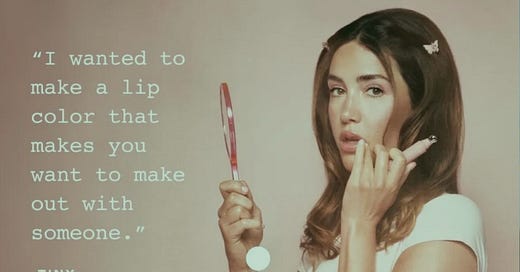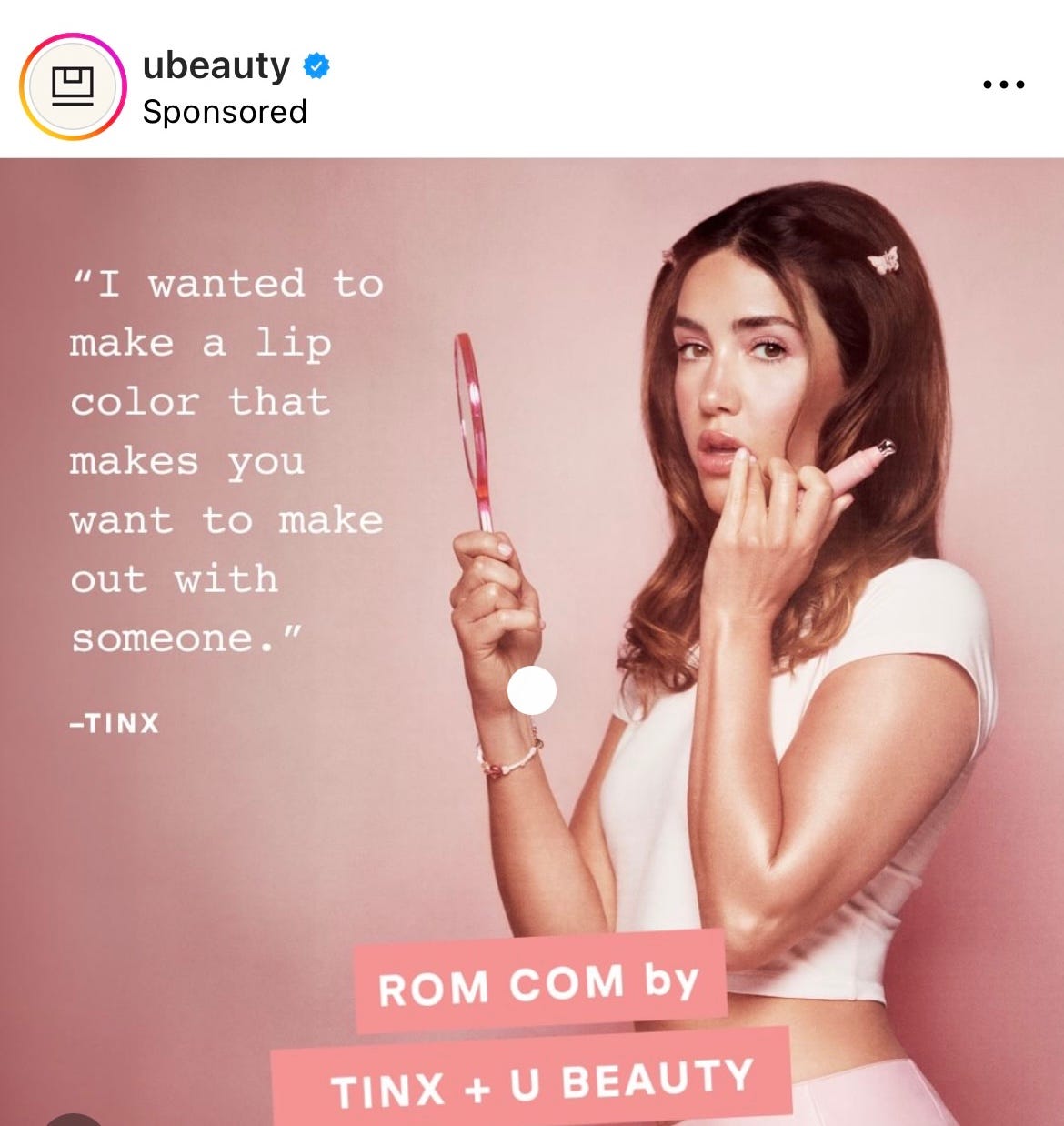Cosmetic Mimetic Desire: A Lip Gloss That 'Makes You Want To Make Out'
Seven experts on the state of sex, beauty, and desire today.
“I wanted to make a lip color that makes you want to make out with someone,” says dating and lifestyle influencer Tinx in an ad for the new lip gloss she created with U Beauty. The color is called Rom Com — a sparkling pink variation of the company’s cult-favorite Plasma Lip Compound ($68).
I know it’s an offhand quote, nothing too serious, but the more I encountered it — two to three times a day, every day, any time I pulled up my Instagram app — the stranger it seemed.
My first thought was: Products typically smear and disappear during a make out session; a lip gloss that inspires kissing also inspires its own removal. If the draw of application is obliteration, what purpose does the lip gloss serve? (Is this the lingerie of makeup?)
There’s also no object of desire here — a specific someone with whom you want to make out. Does one exist? Does it matter? This seems like a narcissistic model of longing, or at least a disembodied one, detached from connection with a person and re-attached to connection with a product. Sanitized, sterilized, safe from the messiness of sex and dating. “Turned on” in a tube.
And then I wondered what this might say about the nature of (primarily female) sexual desire today. The ad prompts a desire for the lip gloss by explicitly framing it as a portal to desiring the feeling of desire, and implicitly framing that eventual feeling of desire as dependent on feeling desirable. But who or what determines desirability? Lip gloss being part of the process suggests an internalized “sale gaze” — an idea of attractiveness not based on the demands of men, but the demands of the market. (If the male gaze describes the psychological condition of existing under patriarchy, the “sale gaze” describes the psychological condition of existing under capitalism.)
Of course, for many, desire is dependent on an aesthetic experience — not of the person you desire, but of yourself. One paper on erotic self-focus notes that “the maximally arousing situation for a man is projecting himself into the scene with a focus on his object of desire as he copulates with her; whereas, a woman appears to find the arousal value in projecting herself into the scene while focusing on herself as the object of desire during the encounter.” Some studies show that women distracted by thoughts of their own appearance during sex may experience “lower sexual satisfaction and less consistent orgasms.” Others note these thoughts only kill arousal if one has a negative self-perception. (Concerning, considering today’s standard of beauty is associated with increased instances of appearance-related anxiety, depression, and dysmorphia.)
I asked some friends what they thought about the U Beauty x Tinx ad. One called it a fetishization (“in the Freudian sense”) of the lips — lips as “an object on which [a] drama or fantasy plays out,” a symbolic stand-in for desire of the whole (i.e., you wouldn’t care to make out with disembodied lips). This tracks: Part of the reason I predicted the lip category would be a big focus for the beauty industry this year is because of their exploitable association with inner wellbeing; lips as a representation of identity — through them we speak, we breathe, we eat, we act out our sexual desires.
Someone else noted that most post-Freudian theories of desire suggest desire isn’t internally located but sourced from somewhere else. “Power, class, capital, the unconscious, etc.” Your desire is never your own.
Naturally, mimetic desire came up — the Girardian theory that “we make many of our choices according to the desires of others — our models,” writes Luke Burgis. This isn’t a bad thing, or even something to overcome. “Imitation is inevitable,” as Girard said. The question is: Who or what are we imitating? And is that conducive to our flourishing and fulfillment? In the case of an almost-$70 lip gloss that encourages constant plumping and lists microplastic Polyester 7 among its top ingredients — and the larger standard of beauty it speaks to — I might say no.
Am I thinking about this too much? Probably! But this is the chosen marketing language of a very popular dating influencer and a very popular beauty brand — a line both parties believe to be worthy of their advertising budget — and I think it’s worth thinking about.
Desire is not my area of expertise, though, so I took the question to seven sex, dating, and desire experts.
I asked:
What comes to mind when you read the tagline “a lip gloss that makes you want to make out with someone,” and what do you think it says about the state of sex, desire, and/or dating today?
They said:
MAGDALENE J. TAYLOR, sex and culture critic (New York Times, GQ, New York Magazine) and writer of the newsletter :
“This tagline embodies several of the ironies of how we approach desire today. Namely, it exclusively centers the self — it wouldn't be all that popular today to say ‘a lip color that makes other people want to make out with you’ or whatever type of message we might have expected from early 2000s Cosmo. And fair enough! Desire for many of us is rooted in feeling good about ourselves, rather than exclusively other people feeling good about us, and that's not an unhealthy instinct. But what might be unhealthy is this notion that a product is what elicits this desire in ourselves. More contradictory, this is a product that likely impedes upon our ability to make out! It's a plumping gloss! It probably burns a little! With that in mind, it employs this centering of the self even further — it's purely selling the idea of ‘feeling’ sexy while being detrimental to the actual acts of sexiness. That, I think, highlights one of the other core ironies of our approach to desire. When we publicly talk about desire in these safe ways (i.e., in marketing copy) we are entirely focused on signaling desire rather than actually experiencing it. And when we do signal that desire, it's really just another means of displaying a public identity, often through our purchases. The male gaze has indeed become what we may call an internalized one, but it seems to me that we're thinking about an ‘other’ just the same. Ideally, people want to make out with you (and you want to make out with them) without the help of a specific shade of lip gloss.”
ERICA CHIDI, author, health educator, entrepreneur, and founder of LOOM:
“The commingling of makeup and sex has always felt very bizarre to me. As a neurodiverse person with persistent sensory issues, it's not very inclusive. Honestly, if I am getting ready to go out on a date with my fiancé, I typically won't wear lipstick because I know we'll make out, and I don't enjoy seeing or feeling smeared pigment on either of us. That said, I do love wearing lipstick, I just usually don't wear it when I'm craving intimacy. I think that we need to create more dialogue around the fact that not wearing makeup can actually be more reinforcing of desire, sensuality, sexuality, and pleasure.”
SHADEEN FRANCIS, certified sex therapist and licensed marriage and family therapist:
“What we often get wrong about desire is that we aren't meant to wait for something or someone to convince us to be in the mood. Eroticism starts with you, you are responsible for your pleasure. How do you turn yourself on? What makes you feel sexy or sensual or hot? The people who have the most pleasurable sex are typically people that turn themselves on, and their partners (if they have them) participate in and support that — or at least don't ruin it! Doing things that make you feel good, believing that you look good, being present, and even touching sensitive parts of your body (like your lips) can all be facilitators of your pleasure. So maybe the gloss might work!”
ALYX GORMAN, lifestyle editor of Guardian Australia and author of an upcoming book about the orgasm gap and the growth of the sexual wellness industry:
“In the last few months, I've asked more than 50 women about the things they do to get themselves in the mood for sex, and not a single one of them has mentioned lip gloss, so my first thought is that she's facing an uphill battle. I'm intrigued by the total lack of the other in the way she's constructed this sentence. It's not about wanting to make out with a specific person, it's about a lip color that makes you feel yourself so hard that ‘someone’ (anyone) will do. Autosexuality has definitely been an important component of some women's internal erotic landscapes in my interviews, and the ‘massively narcissistic’ element of female sexuality is something Esther Perel talks about a lot. From that perspective, the vibe Tinx is trying to evoke isn't far-fetched, nor is it an issue if that's how your sexuality happens to work. But since you can get that same feeling by masturbating in front of a mirror, I'd suggest doing that as a $0 dupe for this product.”
CINDY GALLOP, CEO of Make Love Not Porn:
“That's a very oddly-phrased line. I mean, who doesn't want to make out with someone, any time, anywhere?! If a total hottie came up to me on the street and said, excuse me, I think you're incredibly attractive, can I ask respectfully, could we make out? I'd say, you bet! The way that's worded suggests that the customer's natural instinct is not to want to make out, and she/he/they needs the help of a lip color to make that happen … I don't want to extrapolate too much, because I feel that quote wasn't fully thought through, but in today's social environment it is redolent of lost connection/lack of intimacy and the suggestion that you need artificial aids to help with that, versus the truth, which is that what you wear on your lips has nothing to do with getting to make out with someone. You just need to want to, and be open to it.”
JIMANEKIA EBORN, trauma specialist and sexuality educator:
“When I read that tagline, I thought that this lipgloss would add to the enticingness of my lips. Possibly making them fuller, drawing more eyes. We know that for many folks, that is something that is sexually attractive to them.”
DR. HILARY CALDWELL, MHSc, MApSc, PhD, author of “Slutdom: Reclaiming shame-free sexuality”:
“Rom Com has identified that we have a libido problem – with so many worries and pressures on people today, there seems no time or energy left for sharing pleasure – we all want to want.”
And we’re willing to buy it.






It's impossible for me to read that and not think of the recent Bumble anti-celibacy campaign or the spate of pro-marriage articles urging women (in so many words) to step up and save men and society. Come on girls, $68 is a small price to pay to save civilization!
Hmm… these plump, pink, glossy lips seem suggestive of a pair beneath the belly button. And I appreciate the study on women desiring to be the desired object (having had that experience as part of my own adolescent awakening). It seems that’s the point if these are coded vaginal lips. Tinx’s rich text! Neither a smidge—nor a smudge—over-analyzed.